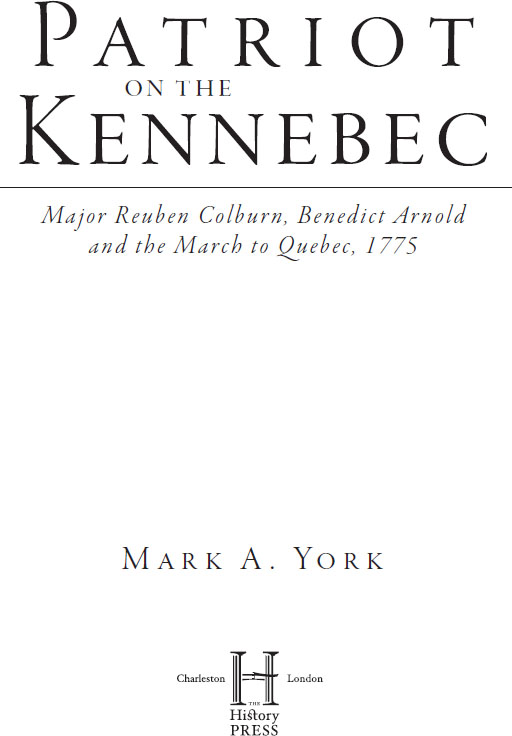

Published by The History Press
Charleston, SC 29403
www.historypress.net
Copyright 2012 by Mark A. York
All rights reserved
Cover art by Sidney Adamson. Courtesy of the Library of Congress.
First published 2012
e-book edition 2012
Manufactured in the United States
ISBN 978.1.61423.837.9
Library of Congress Cataloging-in-Publication Data
York, Mark A., 1953
Patriot on the Kennebec : Major Reuben Colburn, Benedict Arnold and the March to Quebec, 1775 / Mark A. York.
p. cm.
Includes bibliographical references and index.
print edition ISBN 978-1-60949-500-8
1. Colburn, Reuben. 2. United States--History--Revolution, 1775-1783. 3. Canadian Invasion, 1775-1776. 4. Arnold, Benedict, 1741-1801. 5. Maine--Biography. 6. Coburn family. I. Title.
E207.C74Y67 2011
973.3092--dc23
[B]
2011049608
Notice: The information in this book is true and complete to the best of our knowledge. It is offered without guarantee on the part of the author or The History Press. The author and The History Press disclaim all liability in connection with the use of this book.
All rights reserved. No part of this book may be reproduced or transmitted in any form whatsoever without prior written permission from the publisher except in the case of brief quotations embodied in critical articles and reviews.
This book is dedicated to my mother, Norma Colburn York.
CONTENTS
ACKNOWLEDGEMENTS
One who embarks on a project like this has to be grateful for prior scholarship that made a new effort much easier as a result. Kenneth Roberts is the first to thank, for without his work in the 1930s on Arundel, a project like mine would not have been possible. The March to Quebec journals that he collected at his expense and published for such a use were at the forefront of this historical effort. So, too, the work of Justin Smith, who years later contributed the 1901 photograph of Colburn House taken on a visit related to his two key books on the subject and who located the files of Reuben Colburn in Washington, from whence I tracked them down again. By having the words, dates and actual receipts as primary sources, speculation could be held to a minimum. This was a critical aspect. While Mr. Roberts meant to portray the true picture with this extensive research, he failed in some cases. His ancestors, the Nasons, were elevated to a far greater status in his narrative at the expense of real heroes whose contributions were documented in the primary texts. In fact, there was no reference to them in the texts at all. Colburn, however, was not one of them, but his pivotal role was greatly reduced and quickly dispensed of in the story. There was no mention of Reuben, his brothers or his company of carpenters once the army departed for Quebec. After that, it was strictly Steven Nason and Cap Huff who tell the parts of the tale they chose through Robertss eyes.
The false fallibility of the scouts was equally troubling. Instead of adhering to the exemplary record of Dennis Getchell and Samuel Berry, Roberts chose to superimpose a drunken McConkey character in Berrys place, thus blaming local natural sloth, drunkenness and laziness for an incomplete reconnaissance report and, by and large, the failure of the mission. Roberts insinuates this was a typical resident found in this part of Maine. Nathaniel Berry, a younger brother, was one of General Washingtons private guards, so the Berrys should not be dismissed so lightly, let alone libeled, but in fiction anything goes, especially about the dead, who cant be libeled. The rest of the failures lay with the bateaux, but Roberts had Colburn explain himself on that matter, as no other chose to until James Kirby Martin in 1997. So Roberts gets credit for that, as he should. I am grateful that he gave my grandfather dialogue and hence a real character in Arundel that Im sure he had in real life.
Roberts gets Reuben Colburn, but in his dialogue, he left a clue of his prejudice. I was prepared to mislike Colburn, he wrote in Arundel, for being responsible for Washingtons and Arnolds fondness for bateaux; but I had wronged him.
That was when Roberts realized he had no choice but to enter the evidence of the letters from Washington and Arnold, refuting the notion as exhibit A. Good choice. But it revealed the desire expressed by many to blame Colburn for everything. Roberts quickly moved on to simply attacking the inferior Kennebec bateau as compared to an Arundel version. But this was petty, as these two rivers were in no way in the same hydrological realm. The Kennebec River at Pittston was a huge waterway large enough for transports and the launching of one-hundred-foot schooners built on its banks. And besides, Arnolds initial complaint was that Colburn had built them too small, not the other way around. Robertss selective dismissal of my family as a key element in the whole mission in favor of Arnold, and his fictional relative, is laughable (if not damnable). The dismissal of Central Maine local tradition, though as everywhere often faulty, about the stay in Pittston and Fort Western was another example of Kennebunkport prejudice that, when held under the objective lens, fell apart quickly. Im perplexed why Roberts succumbed to selective amnesia when he discovered facts that didnt fit the story he found and wanted to write. The banquet at Howards and the primary references to such a meal were completely overlooked in favor of others that chose not to mention it. And this, he offered in his nonfiction collection, Trending into Maine, was proof of local embellishment. That was a selective bias. What one left out was as telling as what one included. And so it went for the tale of Aaron Burr and Jacataqua, yet Roberts embraced this story word for word in Arundel, while dismissing any basis in reality of the whole thing in Trending into Maine, when a large part of the legend appeared to be factually true based on direct attribution. His relative wasnt included; therefore, it must be a myth, according to the illustrious Maine sage. This logic does not hold up to Mr. Robertss own primary sources on scene.
It was unclear just whom this relative of his actually was who marched with Arnold to Quebec. Steven Nason was a composite character built, for the most part, around a trader, Steven Harding, who was not a Nason. Then who was this mysterious Nason who so nobly marched with Arnold and whose exploits encompassed the efforts of the Colburns in history? Im afraid we dont know. If, as Roberts says in March to Quebec, all the men from Arundel were in Captain Goodrichs division, then we find no Nason listed there. Simply, this lack of evidence of his accomplishments and dismissal of our familys contribution in favor of his was surely a work of fiction, which is not always the case in depicting real events. Perhaps this is what drove Roberts to fiction in the first place.
This was perplexing to one with prominent ancestry in this national event, but I could also point out that the height of land where Arnolds army crossed into Quebec now bears the name Coburn Gore and not Nasons Notch.
I say Mr. Roberts was a conservative because of certain statements on the record about taxes and the policies of Franklin Roosevelt that placed the author in the Republican camp at the very least. Roberts seemed less appalled by Mussolini and the fascists during his stay in Italy in the 30s than by FDRs handling of domestic and foreign affairs during those turbulent times. Roberts championed an anti-immigrant stance while at the
Next page











